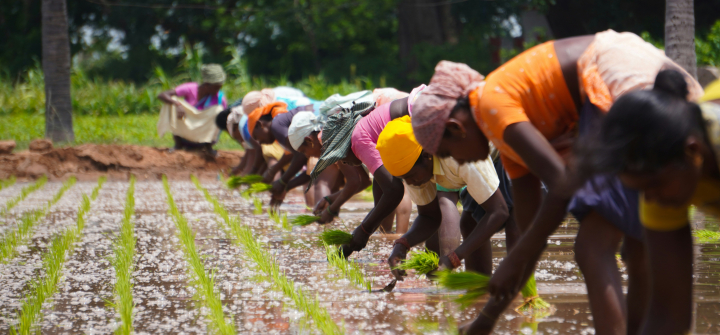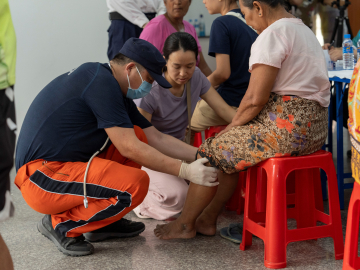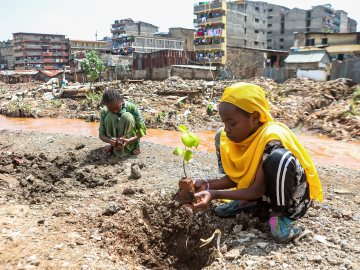Barriers to Land Ownership Create Barriers to Health for Millions of Women
Something’s wrong here: Fewer than one in five landholders in the world are women, per the UN.
Discriminatory social norms, laws, and practices prevent millions of women in developing countries from owning land, depriving them of economic and social benefits.
Crucially, women’s ability to own land affects their health and their children’s health. But despite land ownership’s importance, this issue is generally not on the global health community’s radar.
It should be.
For poor, rural women in developing countries, the barriers to land ownership mean they may not be able to grow enough food to feed their families, are often less empowered to make household decisions, and have limited access to credit and other economic tools to lift themselves and their children out of poverty. These and other impacts, in turn, restrict women’s ability to make decisions about allocating resources in the best interests of their children’s health and their own.
While Africa’s women farmers are estimated to produce at least 70% of the continent’s food, they own significantly less land than men: About 36% of men say they own land versus 13% of women. When women don’t own the land they farm, they are at the whim of the landholder in terms of which crops they grow (cash crops instead of food crops, for example) and how much income they earn. They also can’t use land as collateral to access credit to improve their farms, and they are often ineligible for government farming subsidies and extension services. These factors contribute to lower farm productivity and incomes. The World Bank found that in countries like Malawi, women farmers can be up to 25% less productive than male farmers.
Widows and divorcees are especially vulnerable due to patriarchal norms and inheritance laws that grant women land ownership through their husbands. Once they lose this access through widowhood or divorce, their husband’s family can lay legal claim to their land, leading to eviction and even violence. The UN estimates that 10% of the world’s 258 million widows live in extreme poverty, with loss of land rights as an important contributor.
Yet, when women own land, evidence from around the world illustrates potential health benefits for them and their children:
- In rural Pakistan, women’s land ownership improved their autonomy to make household decisions and was associated with reduced prevalence of child stunting—likely because women were empowered to make purchases that improved their children’s food and nutrition security.
- In Nepal, women who owned land were more likely to have the final say in decisions related to their own health care compared with women who didn’t own land.
- In Vietnam, the children of women land owners were less likely to be ill and more likely to have health insurance and be enrolled in school. Women who owned land were also able to direct household spending towards food rather than alcohol and tobacco.
- In Malawi, women’s sole ownership of land was associated with increased participation in reproductive health decision-making.
It should be noted, however, families and communities may retaliate against women’s land ownership. For example, USAID research in Zambia found that some women who asserted their land rights were subject to resentment and gender-based violence from male family members or community leaders. These findings suggest that even when policy reforms grant women land rights, entrenched social norms and behaviors can still prevent them from fully realizing these rights.
How can the global health community start engaging on women’s land rights?
Beth Roberts, who directs the Center for Women’s Land Rights at the nonprofit Landesa, told me a good first step is learning exchanges. For example, Landesa held a workshop with the University of Washington’s schools of Public Health and Medicine in September 2023 to introduce its work and highlight links between land rights and health.
Evidence shows when their land rights are secure, women “are better able to determine where income for household investments go including for nutrition, health, and education,” Roberts said.
This growing body of evidence is a compelling reason for global health researchers and practitioners to consider women’s land ownership in the context of their own work. They should proactively engage with the land rights sector through learning exchanges and other collaborations.
While expanding women’s land ownership rights is far different from distributing vaccines or malaria medications, it should be a priority for the global health community.
Why? Because it can help improve women and children’s health.
Anila Jacob, MD, MPH, is a physician and food security and global health specialist who works in international development.
Ed. Note: This is the latest in an occasional series of commentaries by Anila Jacob that uncovers nontraditional opportunities for the global health community to save lives and improve health. Her first commentary is “Five Reasons Why the Global Health Community Should Help Save Forests.”
Join the 50,000+ subscribers in 170+ countries who rely on Global Health NOW summaries and exclusive articles for the latest public health news. Sign up for our free weekday newsletter, and please share with friends and colleagues.
Women farm workers in Palacode, Tamil Nadu, India, on September 15, 2020. Deepak Kumar/unsplash





